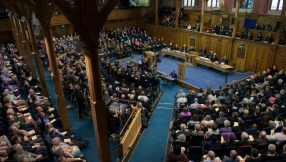Incitement to hatred plans must allow traditional Christian opinion - Churches
Focussing on the use of threatening words or behaviour which are used with the intention of stirring up hatred goes a considerable way towards meeting the Churches' concerns, they say in a memorandum to the parliamentary committee responsible for the Criminal Justice and Immigration Bill.
While they affirm their support for the protection of people vulnerable to attack on grounds of their sexuality or gender identity, the Churches suggest that existing legal provisions in the Public Order Act already offer sufficient protection.
Nevertheless, they question whether these provisions are being enforced effectively and equitably.
The memorandum notes that: "In the religious hatred debates, both supporters and opponents of the Bill maintained a distinction between protection of people from personal attack, which was agreed to be desirable, and protection of their beliefs and practices from criticism or satire, which was generally thought to be undesirable. A similar distinction should be maintained in the field of sexuality."
The memorandum points out that Christian churches "hold a set of beliefs about human sexuality, marriage and family which represents a strong consensus through time and space". It adds that the Christian tradition recognises the contribution of sexual relations to personal growth and well-being but that does not believe that an active sexual life is necessary for human fulfilment.
"Our main concern," the Churches say, "is that any legislation on incitement to hatred on the grounds of sexual orientation permits the expression of traditional Christian (and other) opinions on sexual behaviour and consequent criticisms of particular forms of behaviour or lifestyle.
"As with incitement to religious hatred, we believe it is vital that there should be the maximum possible clarity about what is forbidden and what is permitted.
"Christians engaged in teaching or preaching and those seeking to act in accord with Christian convictions in their daily lives need to be assured that the expression of strong opinions on marriage or sexuality will not be illegal."
The memorandum also draws attention to the possible 'chilling effect' on free speech, which formed part of the debates on religious hatred. "Uncertainty in the law has the effect of inhibiting behaviour which may not in fact be illegal," it points out.
The Churches call for an exploration of safeguards along the lines of those included in the law on incitement to religious hatred, bearing in mind the differences between religion and sexual orientation.
"This would protect expressions of opinion directed against conduct rather than against the person themselves. We have no fixed or final view on this matter but we believe that such an addition could remove any remaining objections to the provision," they say.













